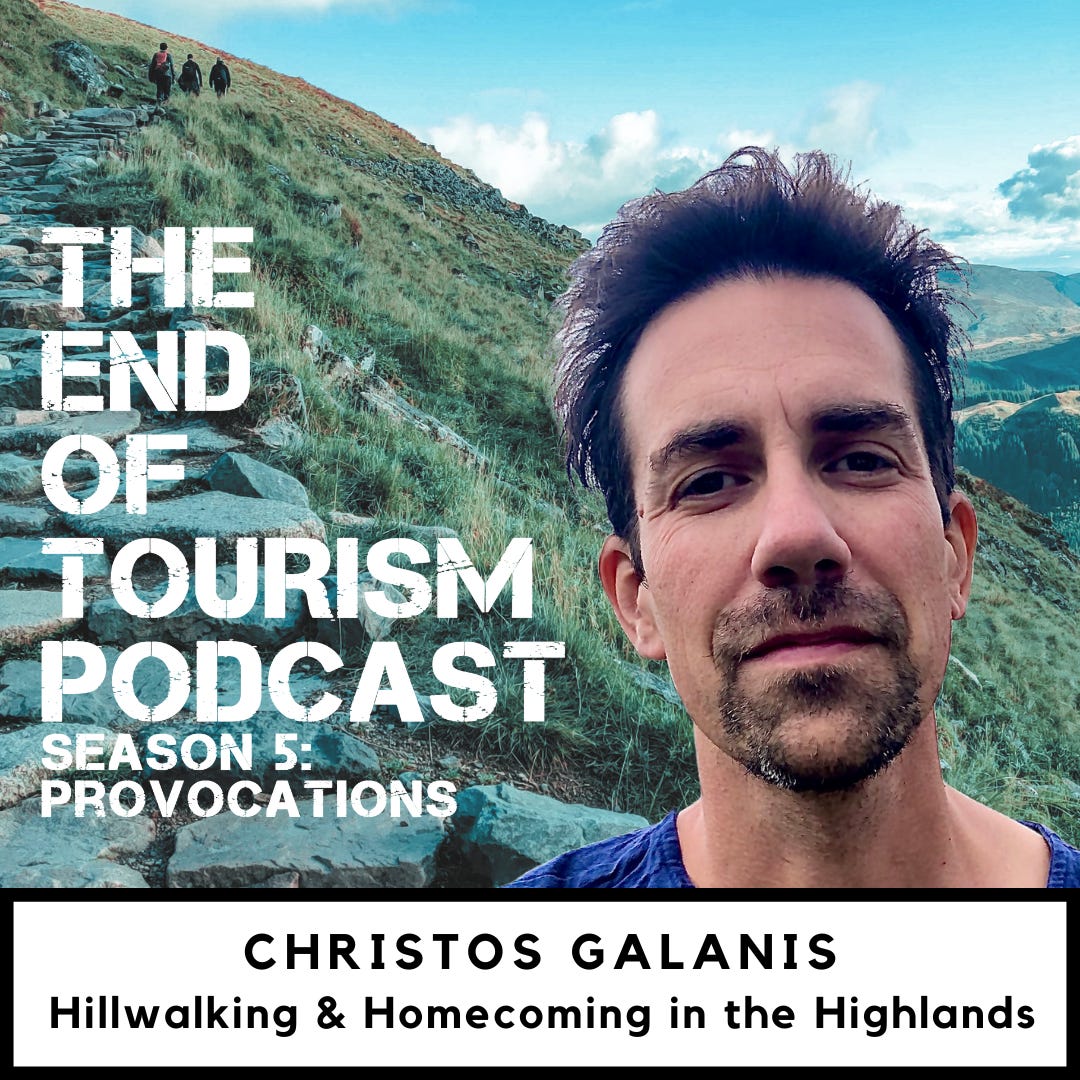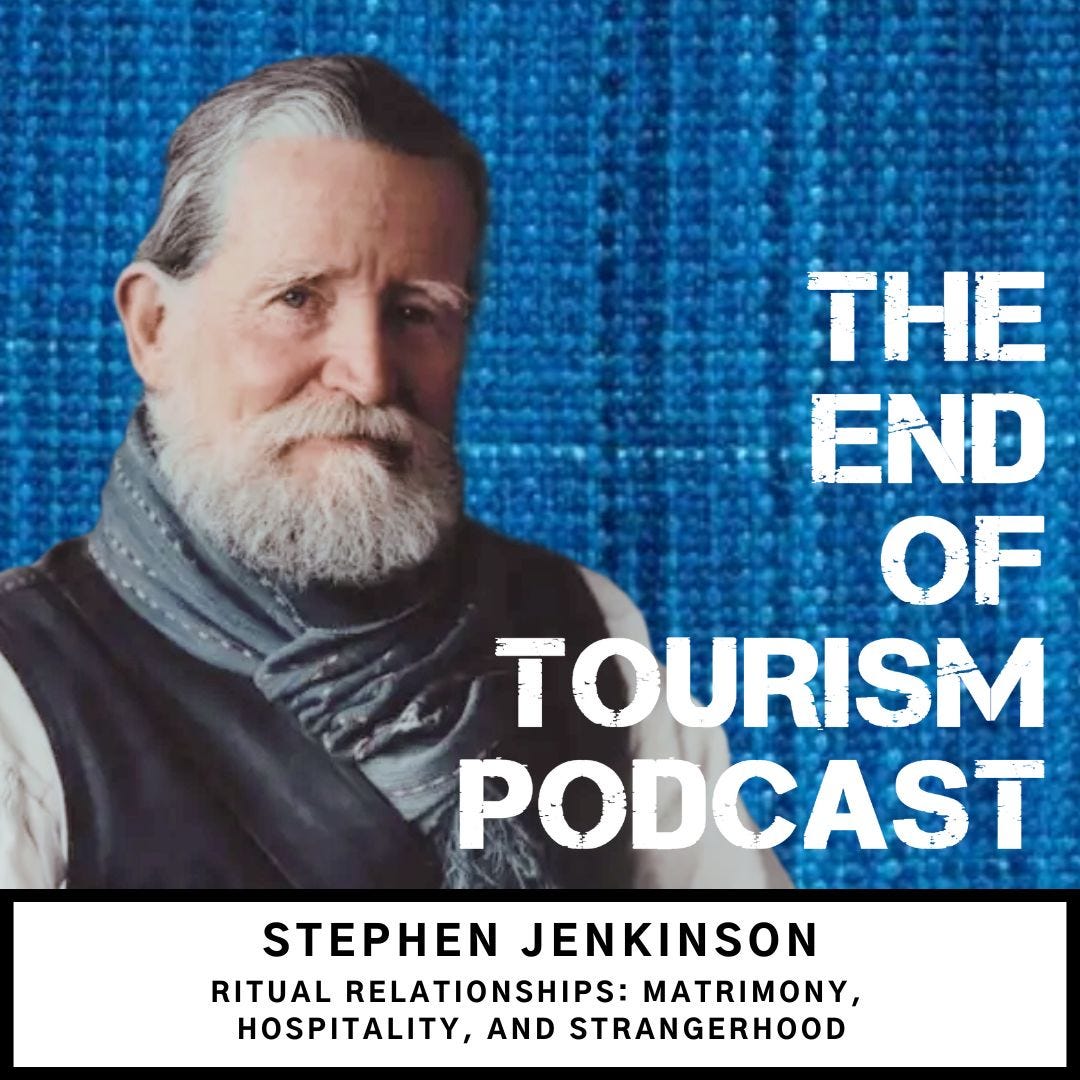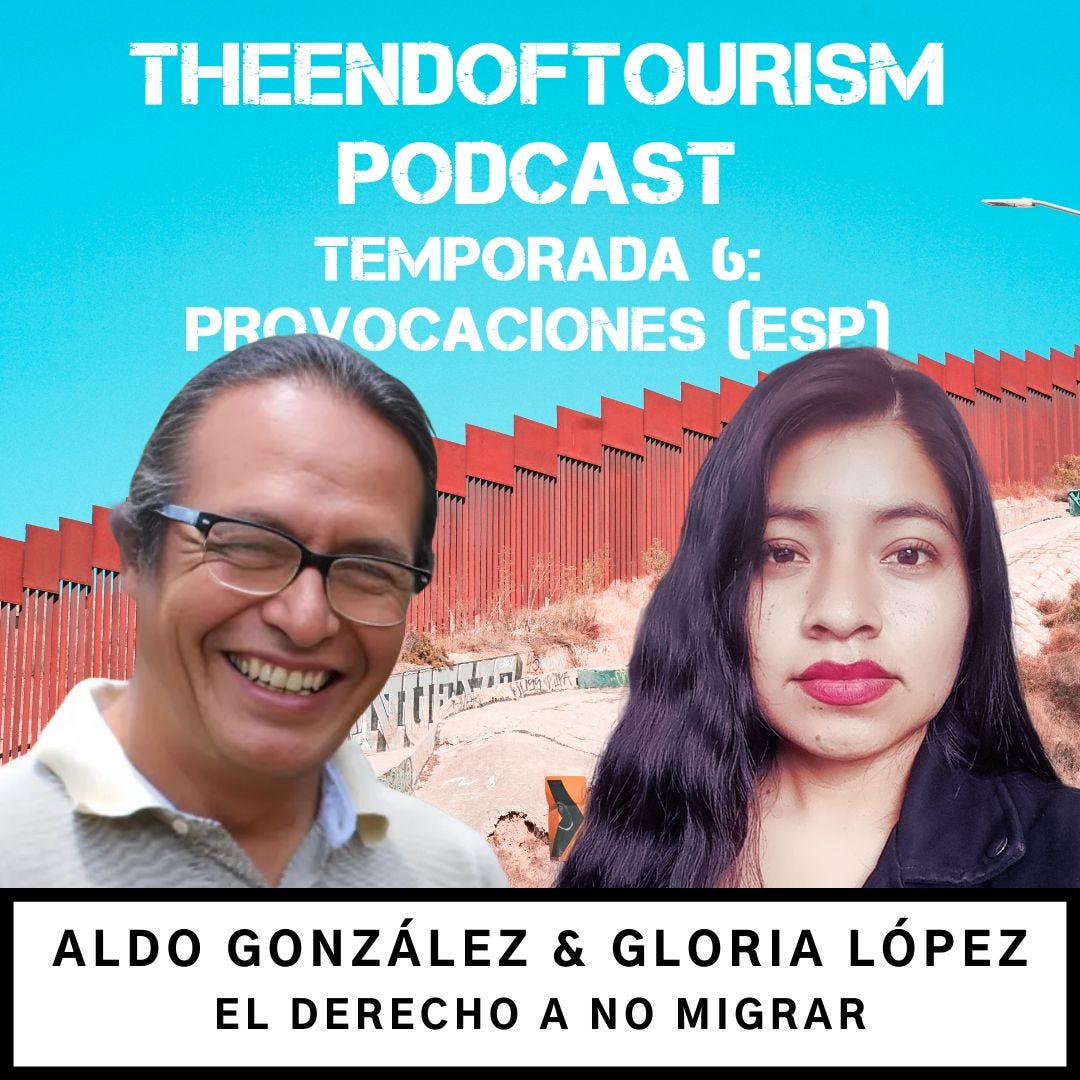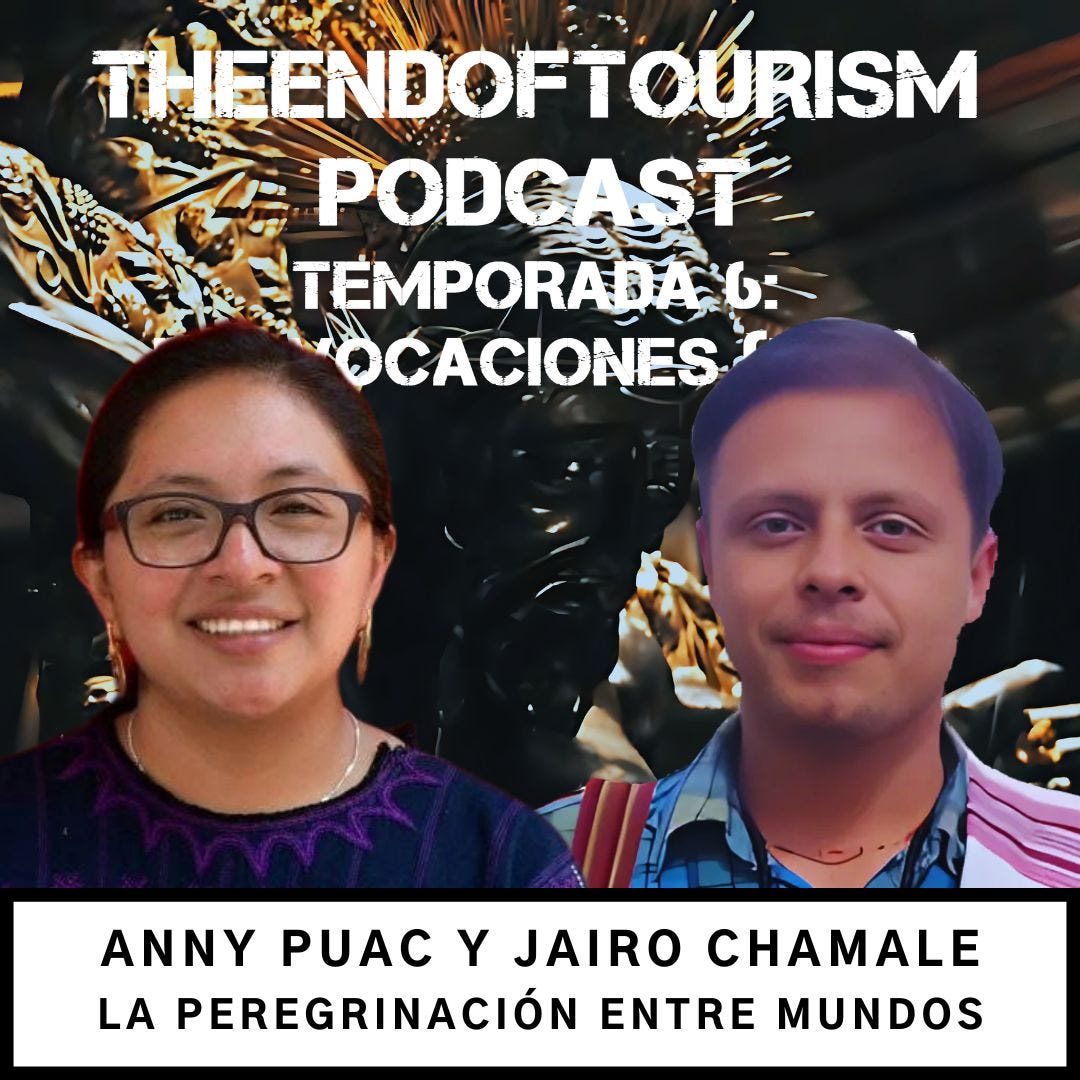S5 #4 | Hillwalking & Homecoming in the Highlands w/ Christos Galanis
Description
On this episode, my guest is Christos Galanis, a friend and scholar who recently completed his PhD in Cultural Geography from The University of Edinburgh where his research centered on themes of displacement and memorial walking practices in the Highlands of Scotland. A child of Greek political refugees on both sides of his family, Christos' work looks at ways in which ceremony and ritual might afford us the capacity to integrate disconnection from place and ancestry. Further, his research into pre-modern Gaelic Highland culture reveals animistic relationship with mountains which disrupt easy definitions of colonialism and indigeneity.
Show Notes:
Summoning and Summiting a Doctorate
The British Empire & Everest
The Three Roots of Freedom
Hillwalkers and Homecoming
The Consequences of Staying and Leaving
The Romans Make a Desert and Call it Peace
Farming Emptiness
Landscapes as Mediums
Ritualized Acts of Walking
Homework:
Christos Galanis’ Official Website
Transcript:
Chris: [00:00:00 ] Welcome, Christos, to the End of Tourism podcast.
Christos: Thank you, Chris.
Chris: Thank you for joining me today. Would you be willing to let us know where you're dialing in from today?
Christos: Yeah, I'm calling in from home, which at the moment is Santa Fe, New Mexico in the United States. Yeah, I moved out here for my master's in 2010 and fell in love with it, and and then returned two years ago.
So it's actually a place that does remind me of the Mediterranean and Greece, even though there's no water, but the kind of mountain desert. So there's a familiarity somehow in my body.
Chris: Sounds beautiful. Well I'm delighted to speak with you today about your PhD dissertation entitled "A Mountain Threnody: Hill Walking and Homecoming in the Scottish Highlands." And I know you're working on the finishing touches of the dissertation, but I'd like to pronounce a dear congratulations on that huge feat. I imagine after a decade of research and [00:01:00 ] writing, that you can finally share this gift, at least for now, in this manner, in terms of our conversation together.
Christos: Thank you. It was probably the hardest thing I've done in my life in terms of a project. Yeah. Nine years.
Chris: And so, you and I met at Stephen Jenkinson's Orphan Wisdom School many years ago. But beyond that from what I understand that you were born and raised in Toronto and Scarborough to Greek immigrants, traveled often to see family in Greece and also traveled widely yourself, and of course now living in New Mexico for some time. I'm curious why focus on Scotland for your thesis?
Christos: It was the last place I thought I would be going to. Didn't have a connection there. So I did my master's down here in Albuquerque at UNM and was actually doing a lot of work on the border with Mexico and kind of Southwest Spanish history.
I actually thought I was going to go to UC San Diego, partly because of the weather and had some connections [00:02:00 ] there. And two things happened. One was that you have to write your GRE, whatever the standardized test is you need to do for grad school here in the US, you don't have to do in the UK. So that appealed to me.
And it's also, there's no coursework in the UK. So you just, from day one, you're just doing your own research project. And then I wanted to actually work with what Was and probably still is my favorite academic writer is Tim Ingold, who was based in Aberdeen up in the north of Scotland and is kind of that thing where I was like, "well if I'm gonna do a PhD What if I just literally worked with like the most amazing academic I can imagine working with" and so I contacted him. He was open to meeting and possibly working together and so I was gonna fly to Scotland.
I was actually spending the winter in Thailand at the time, so I was like, if I'm gonna go all the way to Scotland, maybe I should check out a couple more universities. So, I looked at St. Andrews, which is a little bit north of Edinburgh, and then Edinburgh, then visited all [00:03:00 ] three schools, and actually just really fell in love with Edinburgh, and then in the end got full funding from them. And that took me to Scotland. And I didn't know what was in store for me. I didn't even follow through on my original research project, which had nothing to do with Scotland. The sites that I was actually proposed to work with was on the Dine reservation out here in Arizona. There's a tradition, long tradition of sheep herding and there's a lot of, some friends of mine have a volunteer program where volunteers go and help the Diné elders and herd their sheep for them and what's happening is they're trying to hold on to their land and Peabody Coal, a coal mining company, has been trying to take the land forever and so by keeping on herding sheep, it allows them to stay there.
So I was actually kind of looking at walking as forms of resistance and at that time, most undocumented migrants trying to enter Europe were walking from Turkey through Macedonia. So I was actually going to go there. And yeah, once I kind of hit the ground, I realized that that's way too ambitious.
And I [00:04:00 ] decided to focus on this really strange phenomenon called Monroe Bagging in the Highlands of Scotland, where people work all week in their office, Monday to Friday, and then spend their weekends checking off a task list of 282 mountains that they summit. There's 282 of them and they're categorized that way because they're all over 3, 000 feet, which for us in North America, isn't that high, but for the Scottish Highlands, because they're very ancient, ancient, worn down mountains is pretty high.
And also the weather and the climate and the terrain make it pretty treacherous out there. So it's, it's not an easy thing. Yeah. And I just thought this is a really weird, strange way to relate to mountains and to land. And it seems like a very British thing to do. And I kind of just got curious to figure out what was going on and why people would actually do this.
And it came from a very, actually, critical perspective, to begin with. As things unfolded, that changed a fair amount in terms of getting to know people. But, yeah, that was Scotland. And, I think looking back, I think [00:05:00 ] I was called there by the mountains. I can give the bigger context maybe later on, but essentially one of the main mountain called Ben Cruachan, in Argyle that I ended up most working with and kind of going in and doing ceremony for, and with. I ended up later meeting my what would become my wife and married into her family and on one side of her family, they are literally the Macintyres who are from that mountain. So yeah ended up kind of going there and marrying into a lineage of a mountain that was the center of my my dissertation.
So in the end I think I was called there. I think I was called to apprentice those mountains. And then I feel like my time ended. And I think this dissertation is kind of the story of that relationship with that courtship.
Chris: Beautiful. Well, thank you so much for that beautifully winding answer and introduction. So, you know, a lot of your dissertation speaks to kind of different notions of mountain climbing, summiting, hiking but you also write about [00:06:00 ] how our cultural or collective understandings of mountains have defined our ability to undertake these activities.
And I'm curious, based on your research and personal experience, how do you think mountains are understood within the dominant paradigm of people who undertake these practices.
Christos: Yeah, good question. I would say, I know I don't like to speak in universals, but I could say that one universal is that, as far as I can tell, all cultures around the world tend to not only revere mountains, but tend to relate to mountain peaks as sacred.
And so in most cultures, at least pre modern culture, you will always find a taboo around ever actually climbing to the top of a mountain, especially a significant mountain. So ways that you might worship a sacred mountain, for example, you know, in Tibet is to circumnavigate. So hiking, walking around a mountain three times or walking the perimeter of a mountain, kind of circling [00:07:00 ] around and around the summit.
But it would be absolutely abhorrent to actually ever climb to the top. So one thing I was interested in is what happened, what shifted, where in the past people would never think of climbing a mountain summit to that becoming almost the only thing that people were focused on. And I didn't know this, but out of all countries, the country that most intensely kind of pursued that practice was, was England, was Britain, actually.
So it's really fascinating. There's this period, the Victorian era, where basically Britain is invading other countries such as Nepal, India, into China, into Kenya, parts of Africa, South America certainly here in North America and the Americas and of course mountain ranges serve as pretty natural and intense frontiers and barriers, especially back then before. You know, industrial machinery and airplanes and things [00:08:00 ] like that, you're going over land.
And so to be able to get through a mountain range was a pretty intense thing. Really only became possible with kind of Victorian era technology and because they were able to penetrate these places that people really couldn't have before it was a way of kind of proving modern supremacy or the supremacy of kind of modern secularism.
Because even in places like Sutherland and the Alps, the indigenous Swiss also
























